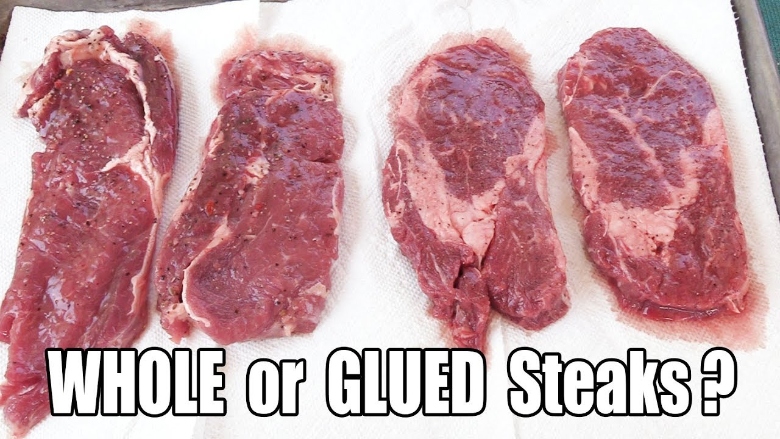A disturbing revelation has sent shockwaves through the food industry: unscrupulous meat suppliers are using toxic glue to bind scraps of meat together, passing them off as premium cuts. This fraudulent practice not only deceives consumers but also poses significant health risks to the unsuspecting public.
At the heart of the controversy is a substance known as transglutaminase enzyme, colloquially called “meat glue.” This enzyme binds smaller pieces of muscle tissue into a unified whole that mimics a high-quality steak, fillet, or roast. While the resulting product may look appealing, it’s essentially a Frankenstein-like assembly of meat scraps held together by potentially harmful chemicals.
Transglutaminase is produced by cultivating bacteria and extracting coagulants from animal blood. Workers who handle the substance are required to wear protective masks to avoid inhaling its hazardous fumes. A leaked video from a supplier shows an employee cautioning, “Don’t breathe that in,” as they apply the glue to meat pieces.
Shockingly, despite its dangers, the U.S. Food and Drug Administration (FDA) classifies transglutaminase as “Generally Recognized as Safe” (GRAS). However, consumer advocates and health experts warn that this classification overlooks the real risks, including exposure to pathogens, potential immune reactions, and unknown long-term health consequences.
The practice becomes even more alarming when considering its deceptive nature. While grocery stores are required to label glued products with vague terms like “formed from pieces of whole muscle meat,” restaurants are not held to the same standard. Diners who believe they’re enjoying a fresh, high-quality steak could unknowingly be consuming glued-together scraps.
Beyond the obvious fraud, consuming glued meat carries serious health risks. Pathogens that reside on the surface of individual meat cuts can spread throughout the glued product, increasing the likelihood of foodborne illnesses.
Furthermore, some individuals may experience adverse immune responses to transglutaminase, which could potentially trigger autoimmune disorders. Critics have also raised concerns about whether the enzyme’s coagulant origins could contribute to blood clotting issues. However, a lack of comprehensive research leaves these risks largely unexamined, putting consumers in harm’s way.
In Europe, food safety standards have banned the use of meat glue, citing its potential dangers to public health. The United States, however, continues to allow the practice, largely due to lax regulations and a regulatory system critics say prioritizes corporate profits over consumer safety.
This scandal is a symptom of a broader issue within the American food industry: insufficient oversight and transparency. The FDA’s willingness to greenlight controversial practices has enabled fraudulent and harmful activities to thrive, leaving consumers vulnerable to exploitation.
Adding to the growing concerns are advancements in mRNA technology in livestock, which introduce additional risks to an already problematic system. Combined with the use of meat glue, these practices create a perfect storm of deception and potential health hazards for consumers.
Consumer advocates and organizations like the Alliance for Natural Health-USA (ANH-USA) have worked tirelessly to expose the truth about meat glue. Their efforts have highlighted the urgent need for stricter regulations, greater transparency, and stronger enforcement to protect consumers from these fraudulent practices.
As the Trump-RFK Jr. administration prepares to take office, advocates are hopeful that new leadership will prioritize consumer safety. The administration has a unique opportunity to implement meaningful changes, such as banning meat glue, mandating transparent labeling, and holding companies accountable for deceptive practices.
Consumers also play a vital role in combating this issue. Here’s how you can protect yourself and advocate for change:
- Check Labels: Look for phrases like “formed from pieces of whole muscle meat” on packaging. If you see this, consider choosing a different product.
- Ask Questions: When dining out, don’t hesitate to ask restaurant staff about the source and quality of the meat they serve.
- Support Local Producers: Buying from trusted local farmers or butchers ensures you’re getting genuine, high-quality meat.
- Push for Policy Changes: Support organizations and initiatives advocating for stricter food safety regulations and increased transparency in the food industry.
This scandal is a wake-up call for consumers and regulators alike. The deceptive use of meat glue highlights the urgent need for reform in the food industry. By staying informed, making conscious choices, and demanding accountability, consumers can take a stand against fraudulent practices and ensure that the food on their plates is safe, authentic, and of the quality they deserve.
The time to act is now. With awareness growing and public pressure mounting, there’s hope that these dangerous and deceptive practices can be brought to an end.



